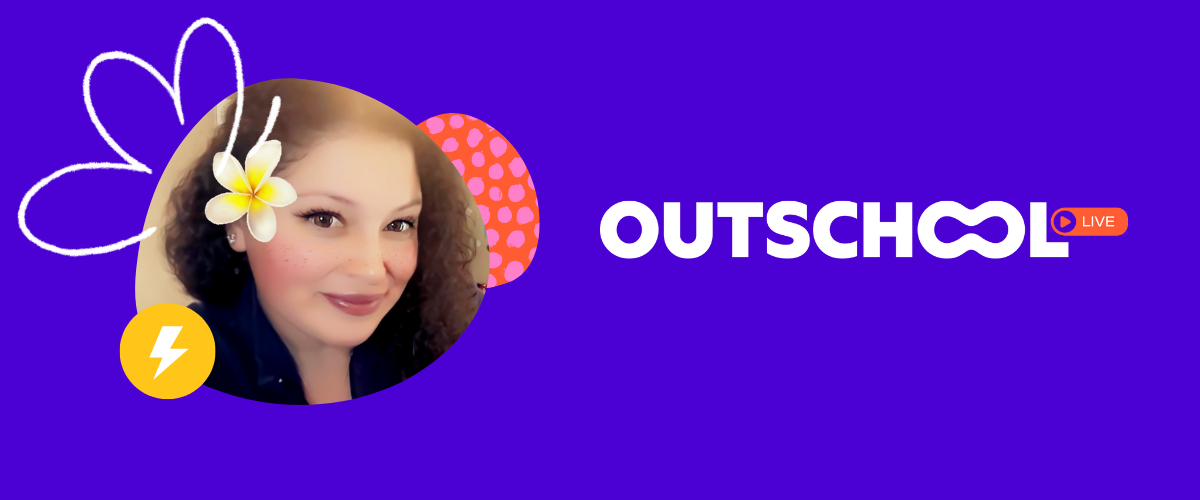Can your children really learn through play? According to Miss Anna—and many parents in the Outschool community—the answer is a definite YES.
Play is engaging, exciting, and provides tons of educational opportunities, and the power of play-based learning is backed up by scientific research too! Recent studies have found that learning focused on play can help kids catch up on essential skills and aid in closing inequality gaps in education.
Outschool Community Guy Fernando recently chatted on Facebook Live with educator Miss Anna about how she uses play-based learning to help kids acquire life skills.
Whether you want to empower your kids with social-emotional learning (SEL) or help them strengthen math skills, play-based learning is an approach worth considering!
Below are some key takeaways from this great conversation. You can also check out the full recording here.
Meet Miss Anna
Miss Anna is an educator and homeschooling mom who specializes in active, play-based classes. She loves helping students acquire life skills in a fun and engaging environment. Miss Anna is an ACE-certified educator here at Outschool, which means that she's committed to offering an excellent and inclusive class experience.
Parents sometimes are skeptical of play-based learning, but Miss Anna says that it's an approach she wishes she'd had access to as a child. She believes that play provides a low-pressure way for kids to gain skills in areas where they struggle. Miss Anna shares that interest-based learning can help spark a child's lifelong interests too.
Miss Anna is proud to offer classes that are ESL and neurodiverse-friendly. She believes that all learners deserve the opportunity to benefit from the power of play. Miss Anna has more than a decade of teaching experience in Music, P.E., and Literature. She has taught over 900 classes on Outschool and doesn't have plans of stopping anytime soon.
What is play-based learning?
One of the first things Fernando wanted to know in the live chat was how Miss Anna would define play-based learning. She shared that "play-based learning is when kids are actually learning when they're engaged in play." It's a method where play activities, fitness, dance, and games are used to help kids develop skills.
Miss Anna's classes focus on acquiring life skills and social-emotional skills. In fact, some of the most popular Outschool classes focus on learning life skills. But play-based learning can work for academic subjects, too.
Have you ever played alphabet bingo or gamification in your homeschool? Those are examples of play-based learning!
FIRST MONTH FREE!
Get support that meets kids where they are.
Learn moreHow does play-based learning work?
Miss Anna knows that play-based learning might sound odd to parents at first. It's often associated with preschool classrooms, but play can be used to learn at any age. There are a variety of ways it can be done, too.
One is that it helps engage all five senses. It can distract kids from worries, stress, or fear that prevents them from interacting with others. Miss Anna shares that online fitness classes are one example of play-based learning. These classes work well because they get kids excited and engaged.
Other examples of play-based learning include classes that use games or play with physical items such as bricks or modeling clay. Play-based learning can also be highly social. Miss Anna also teaches friendship social clubs that help kids learn life and relationship skills while making new friends.
Understanding the value of play
Most kids love to play. As babies and toddlers, it's the best way they can learn about their world. As kids grow older, play remains a powerful way to learn because it's FUN. It doesn't feel like learning, so kids tend to be more willing to engage.
Play is also an effective method of learning because it helps students apply knowledge. Maybe you've heard this called "learning through doing." Instead of listening to lessons passively, kids are actively engaging with the material. This type of learning can be especially empowering for neurodiverse kids.
Miss Anna talked about some of the key social skills she helps kids develop in her play-based learning classes. They include
- Active listening
- Patient listening
- Waiting your turn
- Setting personal boundaries
- Being a good friend
All of these skills can be tough to develop. It's okay if you're not sure how to support your children who struggle in these areas yet—educators like Miss Anna are here to help!
There is a wide variety of low-cost educational resources available to parents who want to explore play-based learning. Consider trying a play-based class on Outschool or doing one of these boredom-buster activities with your kids.
Playing board games like Scrabble, Connect 4, and Yahtzee as a family also encourages learning. Game and activity classes that engage kids and give them opportunities to interact with their peers in a safe environment are also great options.
Concentrating on your kids' strengths
Miss Anna says that she shows her learners their strengths instead of highlighting their weaknesses. It's something we can all understand. After all, most of us know what we aren't good at.
Instead, she builds kids up and constantly encourages them. Miss Anna loves getting to know her students so that she's familiar with their interests and strengths. She uses this knowledge to teach crucial skills. It's non-threatening for the child.
It's also downright fun! Fernando recently sat down with Outschool educator Julie Alvarez to talk about how games are a gateway to learning for neurodiverse kids. Many kids who are discouraged in traditional classrooms love to learn, but they don't like to be taught. They want to explore and acquire information on their own.
Play-based learning allows children to do that in a controlled, directed environment. The best part, according to Miss Anna? Kids don't even know that they're learning. They just know that they're having fun and want to keep playing.
Every parent wants to help their kids find their passions and inner strengths. Play-based learning is a powerful way to do that.
If you'd like to explore this method, check out some of Outschool's fun play-focused classes and life skills courses. Or take one of Miss Anna’s amazing classes. There's something for every kid!






.svg)
.svg)







